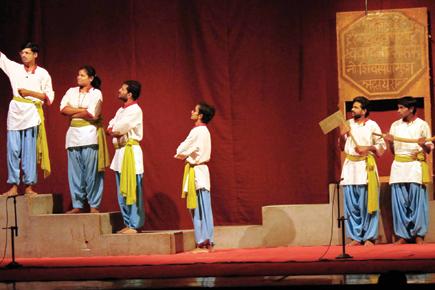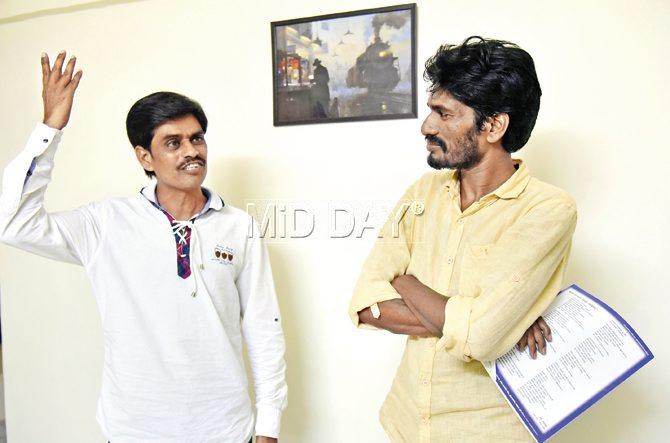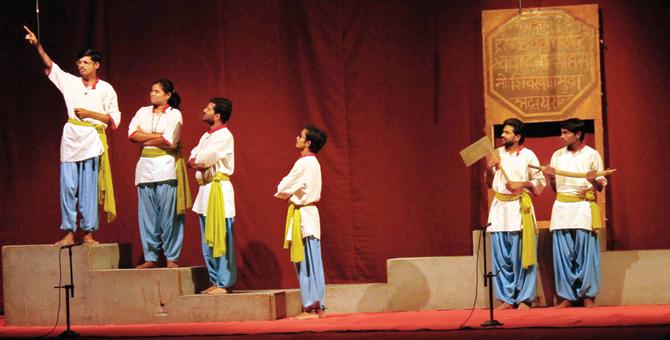A cotton grower from Jalna, Rajkumar Tangde talks of finding both, an escape and catharsis, in theatre

 On March 5, 2005, 29-year-old cotton grower Rajkumar Tangde’s Jalna-based troupe performed the Marathi play Aaakda at Mumbai’s Sahitya Sangh in Girgaum. The play was presented in the dim light of a hurricane lantern — a dramatic device to highlight the plight of debt-ridden farmers who steal electricity to water their crops. In the chat that followed, Tangde’s repertory clarified that Aakda was not a justification for power theft nor was it a case for a loan waiver. The troupe had sold nine quintals of cotton to fund the trip; and also convinced the village talathi (revenue clerk) to accompany them and speak for the village.
On March 5, 2005, 29-year-old cotton grower Rajkumar Tangde’s Jalna-based troupe performed the Marathi play Aaakda at Mumbai’s Sahitya Sangh in Girgaum. The play was presented in the dim light of a hurricane lantern — a dramatic device to highlight the plight of debt-ridden farmers who steal electricity to water their crops. In the chat that followed, Tangde’s repertory clarified that Aakda was not a justification for power theft nor was it a case for a loan waiver. The troupe had sold nine quintals of cotton to fund the trip; and also convinced the village talathi (revenue clerk) to accompany them and speak for the village.

A 40-year-old cotton grower from Jalna, Rajkumar Tangde (left) has taken to playwriting and acting as a coping mechanism. He is seen here with fellow actor Kailash Waghmare. Pic/Shadab Khan
ADVERTISEMENT
Asked about their families’ reactions to the ‘embrace-Mumbai’ assignment, they laughed and said their search for like-minded theatre people here was seen as “waste of money and time.”
“We want to be heard and we want a nationwide audience for our story,” said Tangde.

Tangde’s mission seems to have succeeded. Early this month, the 40-year-old was in Mumbai to speak to technicians and videographers who will work with him on a film to be shot in rural Jalna. This film project runs parallel to his new play, Tisare Paul — currently being rehearsed at his farm — to be presented in Mumbai after the first monsoon showers. It is an allegory in which the members of a Pashu Sabha (Animal Assembly) play out the caste and religion politics of Maharashtra.
Tangde is also prepping up for a special Shivaji Underground show in Mumbai, (for which he received the Maharashtra Foundation Award in 2014), dedicated to the family of a fellow performer who is no more.
References also come in the form of collaborative work. Mentionable is Dalpat Singh Yeti Gava (Dalpat Singh Comes to Village) in which the troupe dealt with the Right to Information Act. Similarly, Tangde has clicked well with film director Jaypraad Desai, who then decided to cast him in the award-winning Nagrik.
Rajkumar’s trajectory has seen special turns. Despite repeatedly failing in the X and XII board exams in the early 90s, he continued to clear the successive exams as an out-of-turn independent student. He secured his Masters last year at the age of 39. Interestingly, Aakda was part of the post-graduate syllabus in Marathwada University way before he graduated. Rajkumar’s philosophy of theatre is straight and simple. “Plays are like seeds. They sow good thoughts and keep us away from suicide.”
Excerpts from an interview:
Q. How does it feel to be writing, acting and touring India with Shivaji Underground in Bhimnagar Mohalla while your family grows cotton in distant Jamb Samarth?
A. I have been writing and performing since I was in Class 8. Our village has had a long theatre tradition. People of all backgrounds come together to watch plays during Ram Navami, Republic Day and Ganeshotsav. Even today, a play remains the easiest way to reach out to 3,500 villagers.
I always felt plays should mirror reality. So, when it was my time to say what I felt as a student who hated school or as a small-scale farmer who did not earn well, I thought I should write on poor transport and drought. My first play was based on the death of a girl in the neighbourhood in a case of dowry harassment. It was received with warmth in all the adjoining villages, and ever since, I have enjoyed encouragement for my writing. While I am writing, a part of me is sowing moog
and jowar.
Q. Your village is the birthplace of 17th century saint Samarth Ramdas, who influenced Shivaji. Isn’t that dramatic?
A. There is a lot of unintentional drama in this legend, but the reality is that it is a village where 70 per cent of the 4,000 acre agricultural land lies mortgaged with banks or moneylenders. Except for the Hanuman temple, each land holding is a pawn and each farmer has a debt on his head; a handful earn R10,000 per month. The per quintal production cost (R3,500) of cotton matches its sale value (R3,800 per quintal), giving the farmer a ridiculously small profit margin. Every year, at least two farmers commit suicide and their relatives haven’t been successful in ‘validating’ the deaths as stemming from an agrarian crisis. Poor road connectivity and lack of good schools necessitate rented homes in nearby Partur. What is laughable is that politicians (whom we have elected; three as chief ministers) squabble over our woes and ask for funds that ultimately don’t benefit the region. Some legislators get wild while arguing in favour of separate statehood for Marathwada. But we want to know what difference will that make to our lives? Our village does not have a river to boast of or squabble over, and our region’s development backlog makes international news.
Q. Is it cathartic to enact the life of a dispossessed person [Rajkumar has also acted in films such as Mhadu, Shwet Angar, Nagrik and Bombay Snow]?
A. The act of being on stage or facing the camera becomes a release of emotion. The lines in my play, Aakda (2003) are the real lines of farmers who lost their lives while adjusting the hook on overhead electric wires. The tragi-comic situation in the play Hitshatru (2007) deals with the village politics of family planning policies, particularly the two-child election criteria. Whenever I have to play the underdog, I recall the uncertainty of my life. Recently, I played a beggar in Jaypraad Desai’s upcoming short film, Cine-maa. It was enjoyable to play a ‘papa-beggar’ who has two sets of attires — one as pauper for the morning begging session, and one as a dandy guy for evening movie time.
Q. Does theatre give you the opportunity to speak your mind in real terms?
A. It has blessed me with a precious sense of identity as writer-performer and repertory manager. More than any other play, Shivaji… has given me a sense of purpose; the ability to rise above everyday logistics. Director Nandu Madhav has honed us well in this defining piece on Shivaji’s secular philosophy. It is rewarding that there is a robust audience for a play which is not typical. The play [it crossed the 470-show mark though word-of-mouth publicity], has been performed in all districts of Maharashtra, as well as Goa and Karnataka. It was also staged at the National School of Drama’s Bharat Rang Mahotsav in 2013.
Q. How has your group Rangmala retained its core members for two and a half decades?
A. When we started in the 90s, only two types of people were allowed entry — the school drop out and the bachelor, because they would come for night-time rehearsals after a day’s work at the farm. We were young people with no great earnings but plenty of ideas. Of course, times have changed. New people have joined us. But I have been lucky to get people like Kailash Waghmare and Sambhaji Tangde. Our group is like India’s Rajya Sabha — the quorum doesn’t disintegrate.
Sumedha Raikar-Mhatre is a culture columnist in search of the sub-text
 Subscribe today by clicking the link and stay updated with the latest news!" Click here!
Subscribe today by clicking the link and stay updated with the latest news!" Click here!







